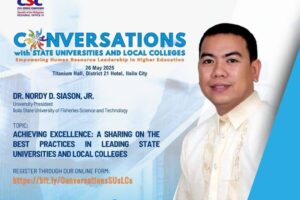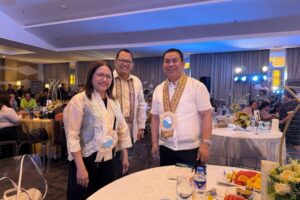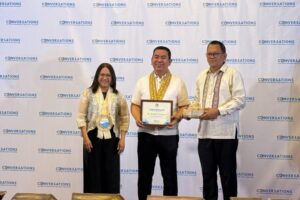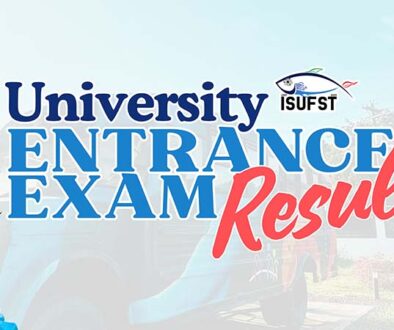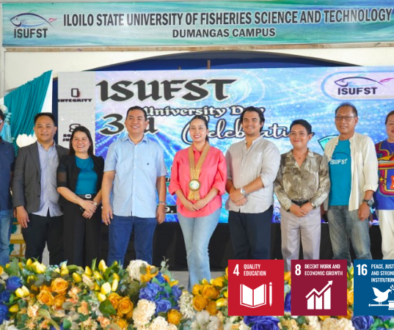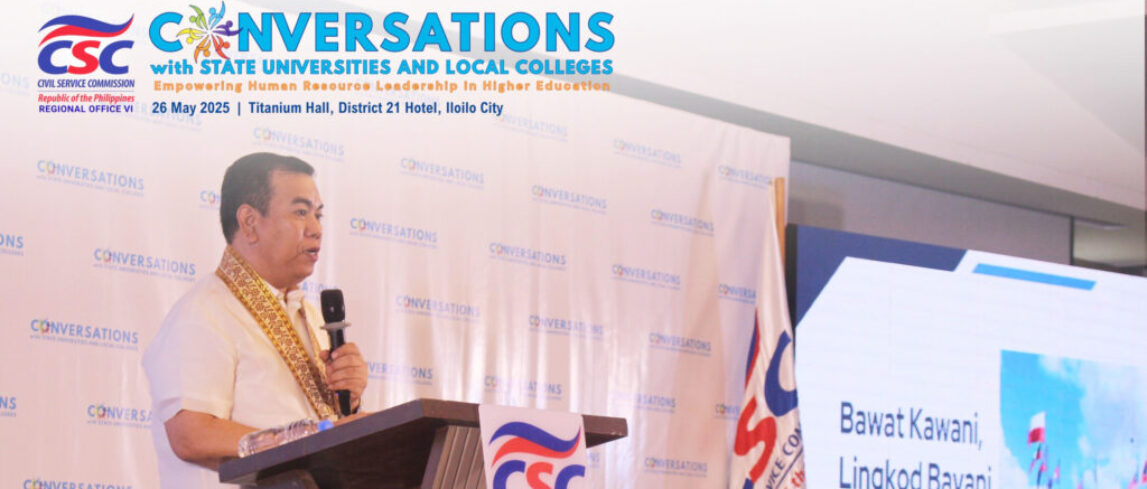
Iloilo State University of Fisheries Science and Technology (ISUFST) President Dr. Nordy Siason, Jr., drew strong applause from over 160 delegates during the first-ever “Conversations with State Universities (SUs) and Local Colleges (LCs)” hosted by the Civil Service Commission Regional Office VI (CSC RO VI) on Monday, May 26, at District 21 Hotel in Iloilo City.
Dr. Siason presented ISUFST’s pioneering and data-driven human resource practices under the theme “BEST Practices HR: Bawat Kawani, Lingkod Bayani,” spotlighting the university’s transformative journey since its conversion into a state university just 28 months ago. With a focus on values-based leadership, he outlined strategic interventions across recruitment, development, performance, and recognition that have propelled the university toward becoming a future-ready academic institution.
At the heart of his presentation was ISUFST’s “scrap-and-build” faculty model, which restructured eight high-tier academic posts—including the coveted University Professor position—into 51 new Instructor I items. This aggressive expansion, Dr. Siason noted, enabled the university to hire 114 new faculty members from 2022 to 2024, reinforcing the institution’s thrust toward grassroots capacity building and inclusive talent development.
“We do not just hire for skill; we hire for heart,” Siason said. “It is Talino at Puso—brains and character—that shape our definition of excellence.” He emphasized ISUFST’s bias-aware hiring practices, meritocratic processes, and commitment to diversity, reflecting the university’s guiding values of Integrity, Social Justice, Discipline, and Academic Excellence (ISDA).
Siason also shared the university’s efforts in staff development, highlighting the integration of counseling services, affirmative action programs, and institutional support for creative and research outputs. He noted the creation of the Student and Faculty Support Center and the pioneering of a policy framework for creative work, as part of ISUFST’s holistic support system for academic growth.
On performance management, he cited ISUFST’s strong internal accountability systems, including active participation in the Times Higher Education (THE) Impact Rankings and an agency performance rating of 4.65—classified as “Very Satisfactory.” He likewise introduced the university’s unique Research and Extension Hub, home to the “Hasa-hasa Theater,” which supports interdisciplinary collaboration. This is on top of many other infrastructure projects he also presented that weave the thrust of his administration for quality, conducive, and inclusive higher education.
“The culture we build is one of recognition, not just regulation,” Siason shared, pointing to ISUFST’s milestone and loyalty awards and its heartfelt tributes to educators like the late Dr. Paler, whose dedication to fisheries education helped shape board topnotchers and future experts. Just this month, his legacy was immortalized with the inauguration of Paler Hall—a review center named in his honor, serving as a lasting reminder of his impact on generations of learners.
During his talk, Dr. Siason also previewed ISUFST’s forthcoming recognitions at the CHED Regional Quality Awards on May 28, which include: Outstanding Board Performance in the October 2024 Fisheries Licensure Exam, 100% COPC compliance for all programs, and multiple distinctions for excellence in community extension, internationalization, peace education, and Indigenous Peoples education. The CSC-hosted forum served as a knowledge-sharing platform, bringing together HR leaders and education officials to strengthen civil service excellence within higher education.
CSC Acting Director IV Atty. Erna T. Elizan opened the event by emphasizing collaboration and shared accountability in policy implementation across the SUC and LC network.
Joining Dr. Siason as featured speakers were CSC Office for Legal Affairs Director III Jamahlin Lacandazo-Escalona, Aklan State University Vice President Julie Ann A. Salido, and CSC NCR Director IV Victoria Esber, who provided insights on PRIME-HRM, legal cases, and the role of transformative HR in academe.
Founded in 1957, ISUFST is the country’s only fisheries university, offering 27 undergraduate and 16 graduate programs across five campuses. With a student population of over 8,500 and a faculty base where half hold doctoral degrees, ISUFST continues to align its institutional mission with national and global development goals, driven by innovation, inclusivity, and service. (Photos by Jeanette Bayona and CSC/Text by Herman Lagon and Edmer Bernardo/PAMMCO)

